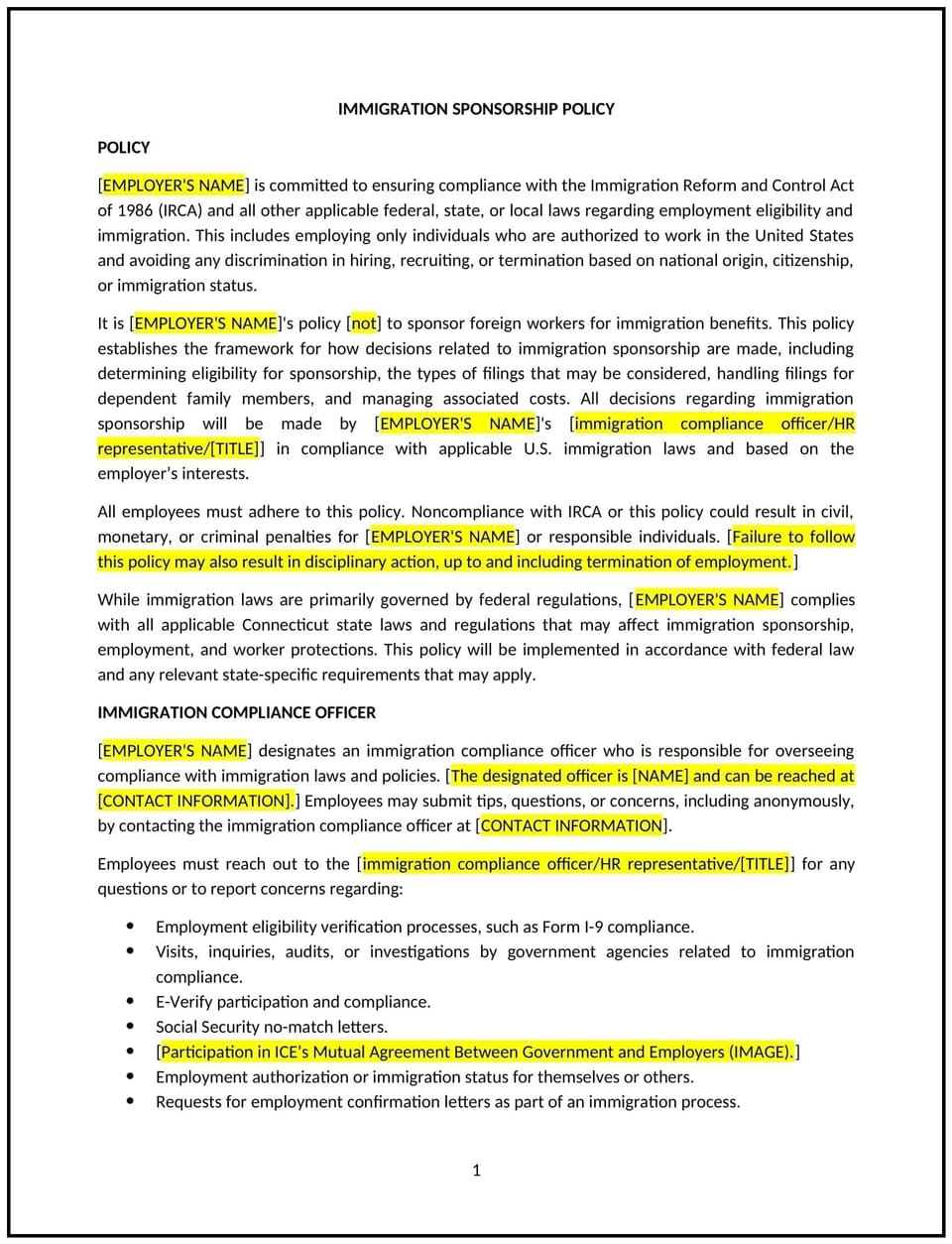Immigration sponsorship policy (Connecticut): Free template

Immigration sponsorship policy (Connecticut)
An immigration sponsorship policy helps Connecticut businesses manage the process of sponsoring employees for work visas or permanent residency. This policy outlines the company's commitment to complying with immigration laws while supporting qualified individuals who may need immigration sponsorship to work in the United States.
By implementing this policy, businesses can attract skilled talent from diverse backgrounds, ensure compliance with immigration laws, and provide clarity on the sponsorship process for both employees and employers.
How to use this immigration sponsorship policy (Connecticut)
- Define sponsorship criteria: Clearly outline the roles and employees that may be eligible for immigration sponsorship, including specific visa types (e.g., H-1B, O-1, etc.) and any qualifications or requirements for sponsorship.
- Establish the application process: Specify the steps involved in the sponsorship process, including how employees can request sponsorship, the documentation needed, and the approval procedures.
- Outline the company’s responsibilities: Detail the company’s role in sponsoring employees, including paying for visa-related fees, providing necessary documentation, and working with immigration attorneys or legal professionals.
- Address employee responsibilities: Define the responsibilities of employees requesting sponsorship, including timely submission of paperwork, cooperation with the company's legal advisors, and maintaining their work authorization status.
- Clarify employment duration and expectations: Specify any conditions tied to immigration sponsorship, such as the duration of employment or the employee’s obligations to remain with the company for a certain period following sponsorship approval.
- Ensure legal compliance: Make sure the policy complies with all federal immigration laws, as well as Connecticut state-specific regulations, to avoid legal liabilities.
Benefits of using this immigration sponsorship policy (Connecticut)
This policy offers several benefits for Connecticut businesses:
- Attracts skilled talent: Enables businesses to hire and retain top talent from global pools by offering the ability to sponsor work visas for qualified candidates.
- Ensures legal compliance: Helps businesses navigate complex immigration laws, ensuring they comply with federal and state regulations when sponsoring employees.
- Enhances workforce diversity: Provides opportunities for a more diverse workforce, contributing to a range of perspectives and ideas within the company.
- Reduces recruitment barriers: Mitigates recruitment challenges by offering sponsorship, particularly for hard-to-fill positions that require specialized skills or experience.
- Promotes employee loyalty: By sponsoring employees for work visas or permanent residency, businesses demonstrate their long-term investment in employees, which can enhance job satisfaction and retention.
Tips for using this immigration sponsorship policy (Connecticut)
- Communicate the policy clearly: Ensure that all employees understand the policy and how they can request sponsorship.
- Provide support throughout the process: Offer guidance to employees who are seeking sponsorship, including helping them navigate paperwork, deadlines, and visa requirements.
- Maintain compliance: Regularly review the company’s immigration sponsorship practices to ensure they comply with changes in immigration laws, regulations, or business needs.
- Work with legal experts: Partner with immigration attorneys or specialists to handle the technical aspects of sponsorship and ensure legal compliance throughout the process.
- Review periodically: Update the policy to reflect changes in immigration laws, business practices, or employee needs to keep it relevant and effective.
Q: How does this policy benefit my business?
A: The policy allows the business to sponsor skilled international talent, helping fill roles that require specialized knowledge or skills. It ensures legal compliance with immigration laws while promoting diversity and improving the company’s talent pool.
Q: Who is eligible for immigration sponsorship?
A: The policy should specify which employees or job roles are eligible for sponsorship. Typically, this includes employees in specialized roles that require work visas (e.g., H-1B) or those seeking permanent residency through employment.
Q: What is the process for sponsoring an employee?
A: Employees interested in sponsorship must submit a formal request to HR or management. The company will review eligibility, work with legal experts to prepare and file necessary paperwork, and pay for applicable visa-related fees.
Q: Does the company cover the costs associated with immigration sponsorship?
A: Yes, the company typically covers visa application fees, legal fees, and other costs associated with the sponsorship process. Employees may be responsible for personal costs, such as medical exams or document translations, if applicable.
Q: How often should this policy be reviewed?
A: The policy should be reviewed annually or whenever there are updates to immigration laws or company practices to ensure it remains compliant and effective for both the business and employees.
This article contains general legal information and does not contain legal advice. Cobrief is not a law firm or a substitute for an attorney or law firm. The law is complex and changes often. For legal advice, please ask a lawyer.


